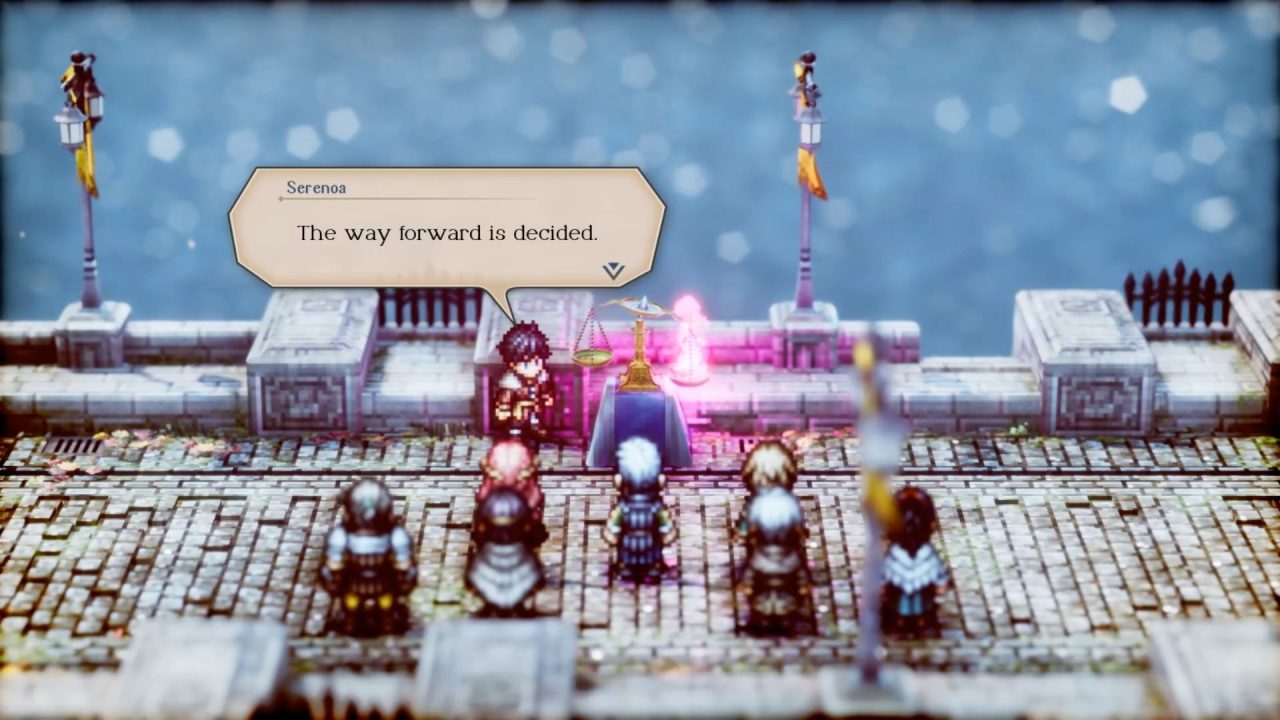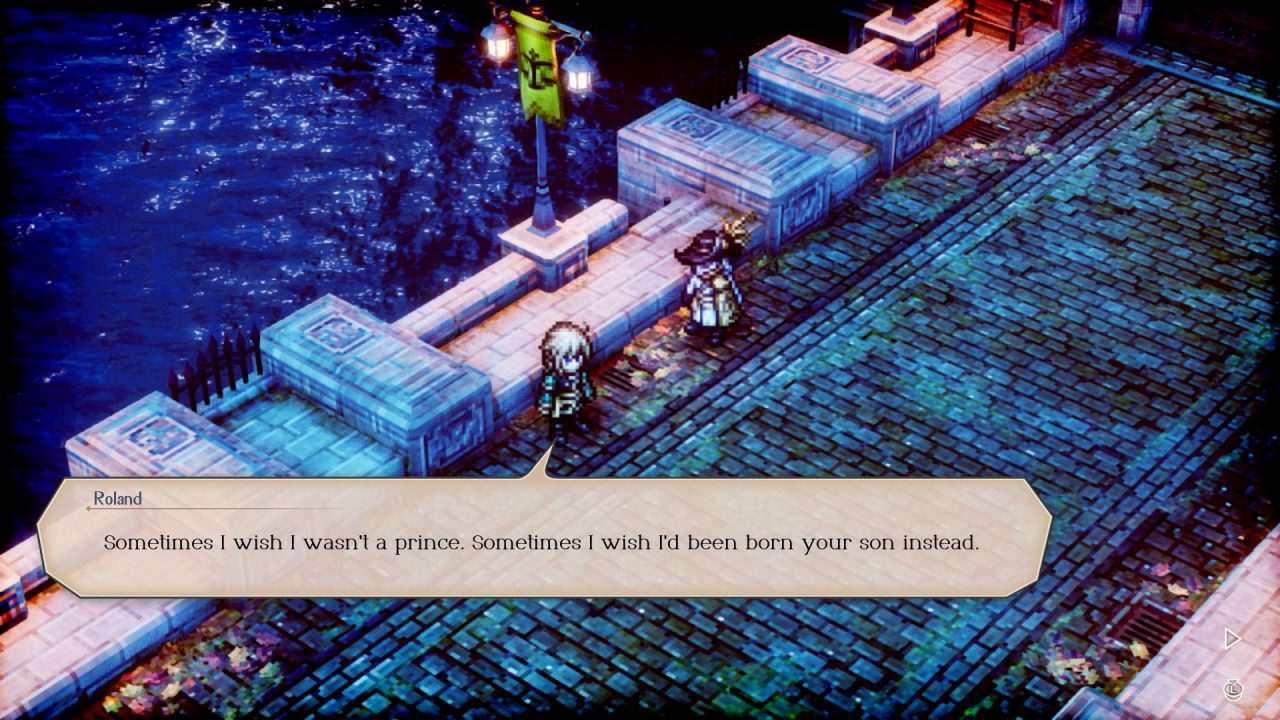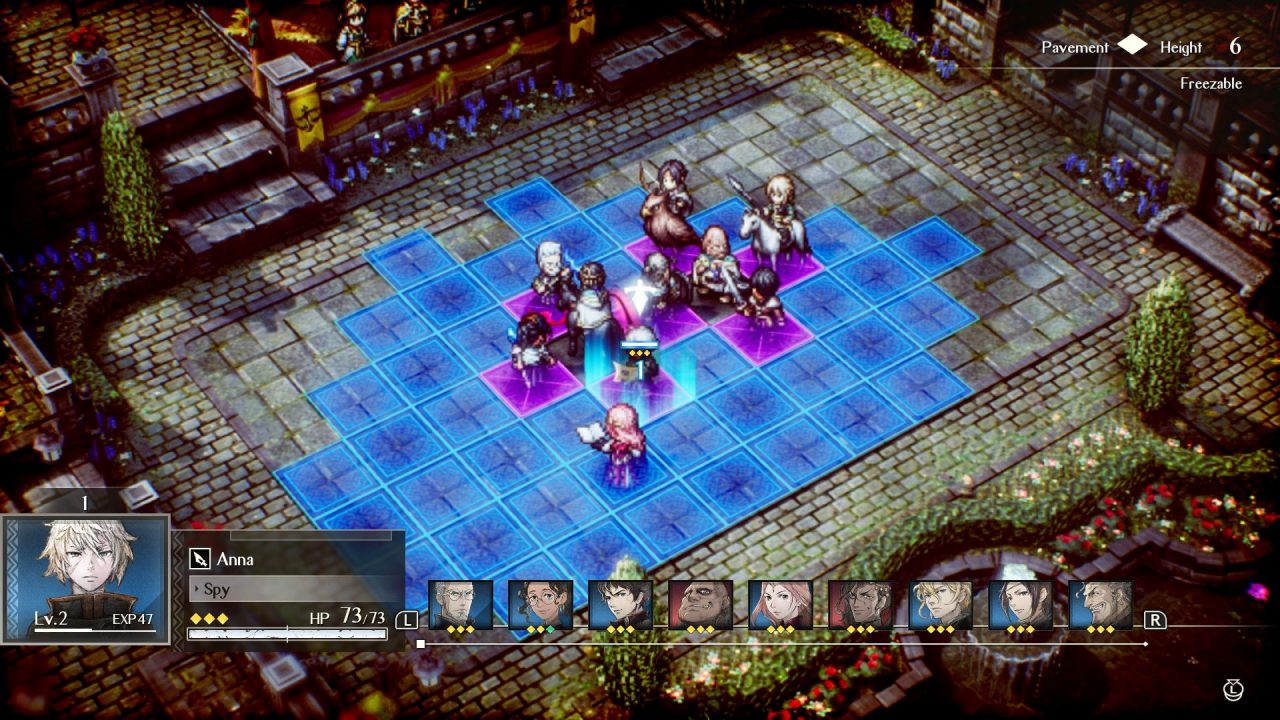Strategy RPGs find themselves in a tricky area; they require a certain level of difficulty, lest there be no need for strategy. Although this, combined with their mechanics, lends the SRPG genre its narrower audience, Triangle Strategy aims for accessibility without sacrificing challenge. The resulting experience is rigid enough in structure to encourage strategic play in the face of challenging situations. It’s also flexible enough to grant players meaningful ways of making their tribulations easier if they so choose, ensuring the game remains respectably challenging no matter how one chooses to approach it.
In Triangle Strategy, characters move in the order of their speed, with various ways to increase your speed or delay opponents’ turns. Enemies may also drop loot once defeated, adding extra objectives to the map as you go along. This combines nicely with characters moving once per turn, before or even after attacking. You may need to move your character to deliver a finishing blow, but you’d then have to wait for another turn to pick up their loot if they drop any—and an enemy may pick it up themselves before you get to move again. Not moving or not attacking can also increase your speed, adding further strategy to the basic game mechanics. It’s an intuitive system that is easily built upon to offer increased depth without feeling overwhelming.
The units themselves build upon this concept, with each unit distinct from one another. Any alignments between them, such as shared weapon types, are minimal. No general class pool means characters don’t step on each other’s toes and players don’t have to worry about who is best in which role; instead, they can focus on mastering each character’s unique applications. Meaningful customization and player expression come instead from weapon upgrades and class promotions. Each character’s weapon is entirely unique, just like their class. Each node in the weapon’s “skill tree” costs coin and some number of materials to unlock, granting stats or special skills when activated. Some nodes are part of a pair, and you can only have one or the other active at a time, forcing players to choose how they want their unit to play. For instance, players can opt to give Hughette, a hawk-riding archer, a longer-lasting blind or a longer-lasting sleep. Sleep is generally more potent but less likely to succeed, so it’s a reasonably balanced trade-off. Once one of these nodes is unlocked, players can also swap freely between them, resulting in an upgrade system that allows freedom of player expression and creativity while still benefiting from strategic thinking and thorough understanding of the gameplay. Nothing is so permanent that players are afraid to make irreversible “mistakes,” further welcoming experimentation.

The rest of the nodes in a character’s weapon can be filled up over time, although the cost to unlock a new node increases with each previous activation. This progression also lends itself to Triangle Strategy‘s strategic accessibility, as players have to prioritize which nodes they want activated first, leaving other nodes to be unlocked much later, or perhaps even in subsequent game playthroughs. The same holds true for class promotions: there are enough materials for characters to promote from the most basic class to a middle-ground “Veteran” class, but it will take multiple playthroughs to get enough materials to promote everyone into their final “Elite” class. It’s up to players to determine which units they want to prioritize upgrading and for what reason.
One consideration in promotion is how much the character is used—as class promotion comes with an increase in certain stats—or if they deem the unit’s promoted class-exclusive skills are worth promoting them for. Even if you were to use Roland the Cavalryman in each battle, you might choose to promote someone else whose unlocked skills will help you put them to better use, or you may choose to promote Roland to give him a boost to a large number of his stats. Whatever your choice, character levels, class, and weapon upgrades all carry over after beating the game and unlocking New Game+. You’re always welcome to try out all the units and upgrade them as you please based on your own experiences and how you’d like to make the game play out.
This method of players affecting the game’s difficulty through their actions rather than simply through a difficulty selection—although Triangle Strategy does feature difficulty settings, too—also manifests in the way maps play and, perhaps more importantly, can be replayed. Players can choose to retreat from a map at any time during one of their turns, and they keep their earned experience and kudos in the process. If any units find themselves falling out of shape, they can catch up in level rather quickly by having them take a few actions in the latest map. Not only does retreating while maintaining experience help players keep units up to speed, but it also allows all gameplay to feel meaningful. Few things are more frustrating than a unit missing a decisive 99% hit chance and getting obliterated by an enemy’s 1% crit chance, leading to a reset or game over and repeating the entire map from square one. If any sort of critical blunder were to happen in Triangle Strategy, however, players would have to start the map over again. Still, maintaining levels gained helps alleviate the frustration since their progress wasn’t entirely lost.
Another key element here is that allies who fall in battle return for the next map. This encourages players to try more diverse strategies—of which there are plenty, given Triangle Strategy‘s layered terrain and magic system—without fear and even continue playing the map as units fall. Instead of restarting a map and accumulating more experience, it’s possible to make things more difficult by continuing the battle; fallen units won’t gain any additional experience because, well, they’ve fallen, and if you manage to make a comeback victory, you’ll be a bit underleveled for the next map. But if you’d rather try to give a character more levels to make the upcoming maps a bit easier, you can always retreat and try again. Players are always encouraged to try out new combinations of units due to the impermanence of the game’s punishments and are always in control of the game’s difficulty with how they choose to approach and reapproach maps. The same applies to the game’s mental mock battles, bonus maps that can be skipped entirely should you not want extra experience or items. Items are also strategically incorporated into this loop through their absence: players don’t keep their loot when retreating from a battle, acting as a fair balance with the experience and kudos players do keep.

Kudos also contribute to the player’s control over the game’s challenge. Kudos are earned by performing unique feats in battle, such as striking an enemy from behind—resulting in a guaranteed crit—or striking from a safe zone. These rewards for playing strategically are worth their weight in gold because they get exchanged for all manner of special items, including weapon upgrade materials, class promotion items, and Quietus Points (QP) and Quietus Skills. Quietus Skills are game-changing abilities that players can use so long as they have enough QP. A basic Quietus Skill such as Restore, which heals an ally of their ailments and restores half of their HP, costs 1 QP, but stronger ones—including the ability to swap out an ally for one you didn’t deploy, and the ability to revive a fallen ally—cost more.
Deciding which Quietus Skill to use and when can massively turn the tide of battle in your favor, but choosing not to use them can also contribute to a more challenging experience. Players who want more of a challenge from this already respectably difficult game can forego Quietus Skills altogether and instead exchange their kudos for weapon materials or even little books of lore that you can read through at your leisure. Players who feel like they need the Quietus Skills, or would simply like that option, can build up their collection and use them in battle as desired. Earning the necessary kudos to unlock the skills and points also requires strategic play to begin with, ensuring players are rewarded for sticking to the game’s roots.
Further rooted into Triangle Strategy is its story. It’s built upon a simple premise—one country on the continent is unwilling to distribute salt fairly—that successfully branches out into more complex, more compelling plotlines—such as that one country using its sacred doctrines and stronghold over salt to justify racial oppression. Triangle Strategy‘s politically charged narrative is both easy to grasp and thought-provoking; each choice offered in response comes with its own slew of benefits and downsides, rather than simplistic “good” or “bad” options. Even aiming to right those certain injustices that are entirely unforgivable, such as the aforementioned racial oppression, comes at some cost, such as the inability to protect your people from an encroaching continent-wide war. None of the choices made are easy ones, making them require just as much consideration and strategy as the primary gameplay.
To make these choices, players must convince their allies to vote during decision segments. It isn’t always easy to influence your peers—even I had a voting session not turn in my favor the first time I played—but it makes the process of trying to sway their opinion feel all the more crucial, which wouldn’t be the case if it was always an easy matter. It also becomes easier to convince your peers in subsequent playthroughs, since the conviction requirements become visible. Not only is Triangle Strategy‘s story gripping enough to encourage repeat playthroughs to see all the possible outcomes of the countless branching paths, but it knows just when to start making the process more manageable so repeat playthroughs feel welcome and accessible rather than like a slog.

The only area in which Triangle Strategy fails to incorporate accessibility is through its visuals. Although stylistically gorgeous, with lush backgrounds and a wide array of character costuming, certain UI elements are simply rough on the eyes. The purple tiles to indicate “danger” zones have more contrast with the “safe” blue squares compared to the game’s initial demo back in 2021, but other necessary information isn’t always conveyed so clearly. A yellow arrow indicates the direction a unit is facing… and highlighting squares to prepare for an attack or skill turns those squares yellow. With unit direction being such a critical component of the game, a clearer way of indicating which way someone is facing seems essential. When it comes to checking your surroundings—another key element of gameplay, considering how much of a role the environment and elevation plays in attacking—you can zoom the camera in and out, as well as rotate it. What you can’t do is pan or tilt it, so when you zoom in to try to see details, sometimes the turn order list ends up blocking something, like nearby enemies or hazards.
While these hiccups do impede the game’s overall flow, it’s thankfully possible to adjust to the extra time certain decisions take. Frustrations arising from the imperfect UI are quickly forgotten as your strategic setups come to fruition, and they entirely melt away as you follow the cast on their winding journey through unexpected circumstances, leading them from one morally complex point to the next. Triangle Strategy is a game that welcomes numerous approaches to its strategic gameplay and multiple runs through its story. No matter which way you proceed, you’re met with an impactful experience, thought-provoking in its mechanics and the story that it tells.
"strategy" - Google News
May 05, 2022 at 11:03PM
https://ift.tt/tcGUPDT
Triangle Strategy - RPGFan
"strategy" - Google News
https://ift.tt/YTSPe2L
https://ift.tt/L6w9ef5
Bagikan Berita Ini














0 Response to "Triangle Strategy - RPGFan"
Post a Comment